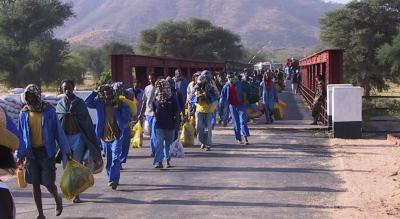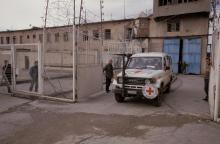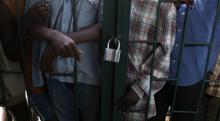Case prepared by Matthew Brown, Angèle Jeangeorge, Yildiz Miller and Eva Vaz Nave, LL.M. students at Leiden University under the supervision of Professor Robert Heinsch as well as Sofia Poulopoulou and Christine Tremblay, PhD researchers, Kalshoven-Gieskes Forum, Leiden University; with the contribution of Jemma Arman and Isabelle Gallino, LL.M. students at the Geneva Academy.
A. THE ALGIERS PEACE AGREEMENT: ESTABLISHMENT OF A COMMISSION RESPONSIBLE FOR CLAIMS RELATED TO THE CONFLICT BETWEEN ETHIOPIA AND ERITREA
“The Government of the Federal Democratic Republic of Ethiopia and the Government of the State of Eritrea (the “parties”), […]
Have agreed as follows:
Article 1
1. The parties shall permanently terminate military hostilities between themselves. Each party shall refrain from the threat or use of force against the other.
2. The parties shall respect and fully implement the provisions of the Agreement on Cessation of Hostilities.
Article 2
1. In fulfilling their obligations under international humanitarian law, including the 1949 Geneva Conventions relative to the protection of victims of armed conflict (“1949 Geneva Conventions”), and in cooperation with the International Committee of the Red Cross, the parties shall without delay release and repatriate all prisoners of war.
2. In fulfilling their obligations under international humanitarian law, including the 1949 Geneva Conventions, and in cooperation with the International Committee of the Red Cross, the parties shall without delay, release and repatriate or return to their last place of residence all other persons detained as a result of the armed conflict.
3. The parties shall afford humane treatment to each other’s nationals and persons of each other’s national origin within their respective territories.
[…]
Article 5
1. Consistent with the Framework Agreement, in which the parties commit themselves to addressing the negative socio-economic impact of the crisis on the civilian population, including the impact on those persons who have been deported, a neutral Claims Commission shall be established. The mandate of the Commission is to decide through binding arbitration all claims for loss, damage or injury by one Government against the other, and by nationals (including both natural and juridical persons) of one party against the Government of the other party or entities owned or controlled by the other party that are (a) related to the conflict that was the subject of the Framework Agreement, the Modalities for its Implementation and the Cessation of Hostilities Agreement, and (b) result from violations of international humanitarian law, including the 1949 Geneva Conventions, or other violations of international law. The Commission shall not hear claims arising from the cost of military operations, preparing for military operations, or the use of force, except to the extent that such claims involve violations of international humanitarian law.[…]”
B. ERITREA/ETHIOPIA CLAIMS COMMISSION’S PARTIAL AWARD REGARDING POWS REPATRIATION
[
Source: The Hague, Eritrea Ethiopia Claims Commission, Partial Award, Prisoners of War, Ethiopia’s Claim 17 between The Federal Democratic Republic of Ethiopia and The State of Eritrea: Permanent Court of Arbitration,
https://pcacases.com/web/sendAttach/751]
1. This Claim (“Eritrea’s Claim 17;” “ER17”) has been brought to the Commission by the Claimant, the State of Eritrea (“Eritrea”), pursuant to Article 5 of the Agreement between the Government of the Federal Democratic Republic of Ethiopia and the Government of the State of Eritrea of December 12, 2000 (“the Agreement”). The Claim seeks a finding of the liability of the Respondent, the Federal Democratic Republic of Ethiopia (“Ethiopia”), for loss, damage and injury suffered by the Claimant as a result of the Respondent’s alleged unlawful treatment of its Prisoners of War (“POWs”) who were nationals of the Claimant.[…]
9. […]In August 2000, the majority of the POWs were transferred to Dedessa; some of the sick and wounded remained until their repatriation in December 2000 and January 2001.
[…]
11. As the findings in this Award and in the related Award in Ethiopia’s Claim 4 describe, there were significant difficulties in both Parties’ performance of important legal obligations for the protection of POWs. Nevertheless, the Commission must record an important preliminary point that provides essential context for what follows. Based on the extensive evidence adduced during these proceedings, the Commission believes that both Parties had a commitment for the most fundamental principles bearing on prisoners of war. Both Parties conducted organized, official training programs to instruct their troops on procedures to be followed when POWs are taken. In contrast to many other contemporary armed conflicts, both Eritrea and Ethiopia regularly and consistently took POWs. Enemy personnel who were hors de combat were moved away from the battlefield to conditions of greater safety. Further, although these cases involve two of the poorest countries in the world, both made significant efforts to provide for the sustenance and care of the POWs in their custody.
12. There were deficiencies of performance on both sides, sometimes significant, occasionally grave. Nevertheless, the evidence in these cases shows that both Eritrea and Ethiopia endeavored to observe their fundamental humanitarian obligations to collect and protect enemy soldiers unable to resist on the battlefield. The Awards in these cases, and the difficulties that they identify, must be read against this background.
[…]
32. The most obviously relevant source of law for the present Award is Geneva Convention III. Both Parties refer extensively to the Convention in their pleadings, and the evidence demonstrates that both Parties relied upon it for the instruction of their armed forces and for the rules of the camps in which they held POWs. The Parties agree that the Convention was applicable from August 14, 2000, the date of Eritrea’s accession, but they disagree as to its applicability prior to that date.
[…]
105. Nearly all of the Eritrean prisoners were ultimately interned at Dedessa. […] It was put into operation as a POW camp in June 1999 and remained so until all prisoners were finally repatriated in November 2002.”
[…]
110. Most of the POWs examined by these doctors had first been interned at Mai Kenetal, and all were sick or suffering from wounds (which is why they were chosen for early repatriation).
[…]
144. […] In its Memorial, Eritrea asked the Commission to “order Ethiopia to cooperate with the International Committee of the Red Cross in effecting an immediate release and repatriation of all POWs....”. However, on November 29, 2002, shortly before the hearing in this claim, Ethiopia released all POWs registered by the ICRC remaining in its custody. While some chose to remain in Ethiopia for family or other reasons, 1,287 returned to Eritrea. During the hearing, counsel for Eritrea expressed Eritrea’s great pleasure at this action. The Commission too welcomes this important and positive step by Ethiopia […].
[…]
150. […] It shows that the Parties, acting with the assistance of the ICRC, began a substantial process of repatriation in both directions promptly after December 12, 2000. Between December 2000 and March 2001, Ethiopia repatriated 855 Eritrean POWs, 38 percent of the total number it eventually repatriated. Eritrea repatriated a smaller number of Ethiopian POWs (628), but they constituted 65 percent of the total eventually repatriated by Eritrea.
151. After March 2001, the process halted for a substantial period. It then resumed in October 2001 with two small repatriations by each Party. Eritrea repatriated all remaining Ethiopian POWs in August 2002. This was followed by the November 2002 Ethiopian repatriation noted above. (The only repatriation of POWs prior to December 2000 was in August 1998 when Eritrea repatriated seventy sick or wounded POWs to Ethiopia.)
152. The chart below shows all repatriations subsequent to the Agreement of December 12, 2000.
|
DATE
|
POWs Repatriated by Ethiopia
|
POWs Repatriated by Eritrea
|
|
December 2000
|
359
|
360
|
|
January 2001
|
254
|
50
|
|
February 2001
|
|
218
|
|
March 2001
|
242
|
|
|
October 2001
|
|
24
|
|
November 2001
|
23
|
|
|
February 2002
|
58
|
25
|
|
August 2002
|
|
294
|
|
November 2002
|
1,287
|
|
[...]
157. While Eritrea promptly released and repatriated its remaining POWs in late August 2002, Ethiopia waited three months, until November 29, 2002, to release the remainder of its POWs and to repatriate those desiring repatriation. This three-month delay was not explained.
[...]
163. [...] While several weeks might understandably have been needed to make the necessary arrangements with the ICRC and, in particular, to verify that those who refused to be repatriated made their decision freely, the Commission estimates that this process should not have required more than three weeks at the most. Consequently, the Commission holds that Ethiopia violated its obligations under Article 118 of Geneva Convention III by failing to repatriate 1,287 POWs by September 13, 2002, and that it is responsible to Eritrea for the resulting delay of seventy-seven days.
[...]
C. ICRC NEWS RELEASE REGARDING POWS REPATRIATION
Addis Ababa/Geneva (ICRC) - Today, 18 February 2002, 58 Eritrean prisoners of war (POWs) and 25 Ethiopian POWs were repatriated under the auspices of the International Committee of the Red Cross (ICRC). During the same operation two Eritrean civilian internees were repatriated from Ethiopia to Eritrea.
All the released individuals had been registered and visited regularly by ICRC delegates during their captivity at Dedessa (Ethiopia) and Nakfa (Eritrea) internment camps, and all the POWs had expressed the wish to return to their countries of origin.
ICRC delegates based in Ethiopia accompanied the 58 Eritrean POWs and the two civilian internees to a crossing point on the Mereb river between the towns of Rama in Ethiopia and Adi Quala in Eritrea. There they were met by ICRC staff based in Eritrea, who took charge of the released prisoners and handed them over to the Eritrean authorities. At the same time the ICRC delegates based in Eritrea, who had accompanied the 25 Ethiopian POWs to the same crossing point, gave them into the care of the ICRC team on the Ethiopian side, who handed them over to the Ethiopian authorities.
Since the peace agreement was concluded between Ethiopia and Eritrea in Algiers on 12 December 2000, the ICRC has organized the repatriation of 937 Eritrean and 703 Ethiopian POWs. At the time of the signing of the agreement, the ICRC had registered and was visiting some 2,600 Eritrean POWs in Ethiopia and some 1,000 Ethiopian POWs in Eritrea.
The Third and Fourth Geneva Conventions of 1949, relative to the treatment of prisoners of war and the protection of civilians respectively, stipulate that all POWs and civilian internees must be released and repatriated without delay after the close of hostilities. Civilian internees are also entitled to return to their last place of residence. The ICRC, which promotes the application of and compliance with the Geneva Conventions, was entrusted by the Algiers agreement with the task of supervising the release and repatriation of POWs and other persons detained in connection with the conflict. The ICRC will continue to facilitate further repatriations and urges the Ethiopian and the Eritrean authorities promptly to release and repatriate all remaining POWs and civilian internees.
Discussion
I. Classification of the Conflict and Applicable Law
1. How would you qualify the situation between Eritrea and Ethiopia between 1998 and 2000? What additional information would you require to make such a determination? Which rules of IHL apply? (
GC I-IV, Art. 2;
P I, Art. 1)
II. Repatriation of Prisoners of War (POWs)
3. When do active hostilities cease, making the repatriation of POWs compulsory under Art. 118 of Convention III? Is a cease-fire agreement sufficient/necessary? Must it actually be implemented? What if hostilities cease without an agreement? (
GC III, Art. 110;
GC III, Art. 118)
4. For how long did Ethiopia wait before repatriating POWs? Is this delay acceptable under IHL? Is reciprocity a relevant legal criterion? What is the risk of requiring reciprocity when it comes to the repatriation of POWs? (
GC III, Art. 118)
5. The Claim Commission mentions wounded and sick POWs: is there a specific provision for the repatriation of this category of POWs? Under what circumstances do they have to be repatriated? (See Document B, paras. 9, 110;
GC III, Art. 110)
III. Elements Contributing to Respect for IHL
6. In your opinion, what brought both parties to eventually release and repatriate POWs?
7. Do you think it can be useful to restate IHL obligations in an agreement following the end of an armed conflict, and to clarify how these obligations shall be implemented? Do you think that the establishment of a Commission looking into potential violations, such as the one created through the Algiers Agreement, is important for the implementation of IHL? For ensuring future respect for IHL?
8. In what way did the ICRC help with the repatriation of POWs? What is the legal basis for the ICRC’s activities in assisting in repatriation cases? Do you think that some form of negotiation and an impartial intermediary can help in such a process? What factors, in your opinion, brought Eritrea and Ethiopia to agree to the ICRC’s involvement in the repatriation of POWs?





